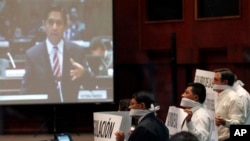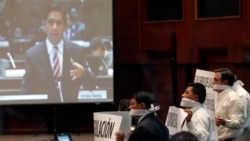After almost four years of debate, the Ecuadorian National Assembly passed a controversial Communications Law supported by President Rafael Correa.
The United States joins other voices in Ecuador and the international community in expressing concern that the law could restrict freedom of the press and limit the ability of independent media to carry out its functions as a critical part of Ecuador’s democracy.
Among other measures, the law prohibits so-called “media lynching,” the spread of information “destined to discredit a person or legal entity or reduce their public credibility.” Organizations such as Human Rights Watch are concerned that the wording of such measures opens the way to censorship, because it essentially grants the government the power to decide whether or not information is “truthful.”
As noted in the Ecuadorian press, Frank LaRue, UN Special Rapporteur on the Promotion and Protection of Freedom of Opinion and Expression, regretted that the law was passed without taking into account recommendations made by the international community, and recommended that the President send it back to Congress for more extensive consultation including with journalists and other stakeholders in the media.
The Universal Declaration of Human Rights declares that everyone has the right to freedom of opinion and expression. The Inter-American Democratic Charter, signed by Ecuador, and 32 other countries in the hemisphere, establishes freedom of expression as an essential component of representative democracy. Active, independent, and responsible media is critical for informing the public.
While it remains to be seen how the new Communications Law will be applied in practice, it is important in a democracy that laws not have a suppressive effect on free speech, narrow the space for fair and unbiased reporting, or lead to self-censorship by the independent media.
In solidarity with the Ecuadorian people, as well as with other governments and stakeholders in the region committed to freedom of expression, the United States underlines the importance of ensuring that the independent media is able to do its work without fear of reprisal or sanction.
Respect for the fundamental freedoms of citizens – including freedom of expression and of the press – is critical to the vitality of representative democracy.
The United States joins other voices in Ecuador and the international community in expressing concern that the law could restrict freedom of the press and limit the ability of independent media to carry out its functions as a critical part of Ecuador’s democracy.
Organizations such as Human Rights Watch are concerned that the wording of such measures opens the way to censorship.
As noted in the Ecuadorian press, Frank LaRue, UN Special Rapporteur on the Promotion and Protection of Freedom of Opinion and Expression, regretted that the law was passed without taking into account recommendations made by the international community, and recommended that the President send it back to Congress for more extensive consultation including with journalists and other stakeholders in the media.
The Universal Declaration of Human Rights declares that everyone has the right to freedom of opinion and expression. The Inter-American Democratic Charter, signed by Ecuador, and 32 other countries in the hemisphere, establishes freedom of expression as an essential component of representative democracy. Active, independent, and responsible media is critical for informing the public.
While it remains to be seen how the new Communications Law will be applied in practice, it is important in a democracy that laws not have a suppressive effect on free speech, narrow the space for fair and unbiased reporting, or lead to self-censorship by the independent media.
In solidarity with the Ecuadorian people, as well as with other governments and stakeholders in the region committed to freedom of expression, the United States underlines the importance of ensuring that the independent media is able to do its work without fear of reprisal or sanction.
Respect for the fundamental freedoms of citizens – including freedom of expression and of the press – is critical to the vitality of representative democracy.

















